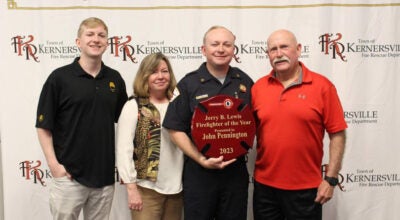Clemmons Village Council rejects rezoning for multi-family apartment complex
Published 12:00 am Thursday, June 11, 2020
|
Getting your Trinity Audio player ready...
|
By Jim Buice
For the Clemmons Courier
Once again, a proposed rezoning request for a multi-family apartment complex adjacent to the Kinnamon Village shopping center off U.S. 158 has been rejected by the Clemmons Village Council.
After the two May meetings that included a public hearing (May 11) and then tabling a vote (May 26), the council voted Monday night against rezoning 6.86 acres from RS-15 & LO-S to RM-12-S (residential building/multifamily) for the Village of Kinnamon project that includes three large buildings with up to three stories, including 41,835 square-feet and 78 units (one, two and three bedrooms).
Councilwoman Michelle Barson made the motion to adopt the inconsistency statement provided by staff, which reads as follows:
“The Clemmons Village Council finds the action to amend the Village’s Official Zoning Map regarding portions of tax parcels 5893-30-8703 and 5893-30-9990 from LO-S (Limited Office — Special) and RS-15 (Residential Single Family) to RM-12-S (Residential Multifamily — Special) to be inconsistent with the Village of Clemmons Community Compass (2040). The Clemmons Community Compass (2040) calls for Village-Scale Office and Retail use on the parcels of interest. The Village’s RM-12-S zone does not meet Village-Scale Office and Retail as the use is not a commercial use and the proposed development is too high of a density for a village scale development. The current zone of RS-15 and LO-S conform closer to Village-Scale Office and Retail, and will assist the parcels of interest reach its intended goal of development in step with Village-Scale Office and Retail, and to reject the rezoning request in docket C-234.”
The final vote against the rezoning was 4-1 in favor with councilwoman Mary Cameron casting the lone dissenting vote.
The first part of Monday night’s virtual meeting included about 30 minutes of public comments where Village Clerk Lisa Shortt read comments from individuals, including property owner Carlos Pereira, overwhelmingly in favor of approving the rezoning.
Reasons stated included the $11.5 million investment; an increase in property values for the area; more property taxes for Clemmons; more housing for those working in Clemmons; revitalizing the Food Lion shopping center and surrounding area; that former council member Mike Combest did a previous study on why the development should be approved; that the previous issue of fire safety had been addressed; that the apartments are nestled off the roadway (U.S. 158) and meet the intent and vision of the Community Compass Plan; and that the Clemmons Planning Board and planner voted in favor of the rezoning.
Other comments included adverse reaction to Clemmons having to pay $150,000 in a settlement to resolve claims raised by the N.C. Human Relations Commission that “reasonable grounds exist to believe that unlawful discriminatory housing practices have occurred” in reference to the first rezoning case for the same Allegro development property that was denied, and mentions of racial overtones and discrimination due to socioeconomic status or race.
“The proposed rezoning C-234 complies with everything the city of Clemmons requires,” Pereira said. “All issues brought up by the council have been responded to, therefore no issues should be to finally approve. Why would you want to vote against? We have lost properties tax collections by negating last time to develop.
“I hope that the council members will not make the same mistakes as before and the personal beliefs or others complaining about the type of individuals or ‘quality’ of people that could live there blows out/destroy the opportunity. All people lives matter, not just one or the other color, all people lives matter.”
Developer Ron Davis of Allegro weighed in with his comments on how the tax values have declined in this part of Clemmons, offered an example of two other projects that were in “literal conflict” to any Compass Plan versions but conformed “in spirit” and “intent,” and that the original Small Area Plan for Village Point “does not in any way resemble” what has been approved and built.
After a light business portion of the meeting, the rezoning action item was next on the docket, but before any council deliberations and the ultimate vote, Mayor John Wait said he wasn’t trying to throw stones or create divisiveness but felt he needed to speak in the sake of transparency on the upcoming proceedings.
“I do think the public needs to know that in addition all the public comments that we heard at the beginning of this meeting that I also got a lengthy demand letter from the petitioner’s attorney, and the letter was very clear,” Wait said. “It said you either need to approve this, or you’re going to get sued.
“I want to be clear that we as the council do not control what the public says, and I as mayor do not control what the council does. I believe what the petitioner has done has really put the council in an impossible position. If this project gets approved, then someone is going to say that they got bullied by this petitioner. Then if it’s not approved, the petitioner and others are going to claim discrimination or whatever else.”
Wait added he hadn’t “heard one comment from any council member about who will be living in these apartments. And I want to say that personally I find this behavior unacceptable. I don’t know of any town that can do development by legal threat. I’ve spoken to every council member. They’re going to discuss and evaluate this project based on these buildings proposed for this particular piece of land. That’s it — not a lawsuit.”
Councilman Chris Wrights said this is purely a land-use decision.
“When you look at our Community Compass with the land-use plan, it’s not just specifically this lot,” he said. “It’s the whole U.S. 158 corridor as laid out in our Comprehensive Plan that does not allow for this sort of development.”
Wrights said he was surprised with some of the public comments about council members being accused of being racist and this being a race issue.
“I don’t know where that’s coming from,” he said. “In my conversations with other council members, I’ve not heard anybody bringing race into this one single time. I haven’t heard from any of the public comments that people that are opposed to it bringing race into this.”
Cameron, who ended up being the only “no” vote, said that has probably been the most difficult decision she has had to make while serving on the council.
“I can make an argument on both sides for approval and denial,” she said. “This project meets all the requirements of the UDO, which is an ordinance, but it does not meet all the expectations of the Comprehensive Plan, which is a guide. That’s what I have been wrestling with for literally weeks.”
Barson, who made the motion to reject the rezoning request, said that she doesn’t take it lightly to veer from the Comprehensive Plan.
“Over the past week, I’ve heard from a number of individuals involved with this project,” she said. “There is no doubt in my mind this would be a quality product and is something our community currently lacks. I have a real concern over the specific location chosen — especially when we have other areas in our community appropriately zoned for this use.”
Councilman Scott Binkley said that is was a great plan for Clemmons but agreed that it “was not right for that spot.”
A similar project on this site was proposed in 2015 by Allegro and denied by the council but later resulted in a conciliation agreement, with Clemmons paying $150,000 in the settlement in January 2019, to resolve claims raised by the N.C. Human Relations Commission that “reasonable grounds exist to believe that unlawful discriminatory housing practices have occurred.”



